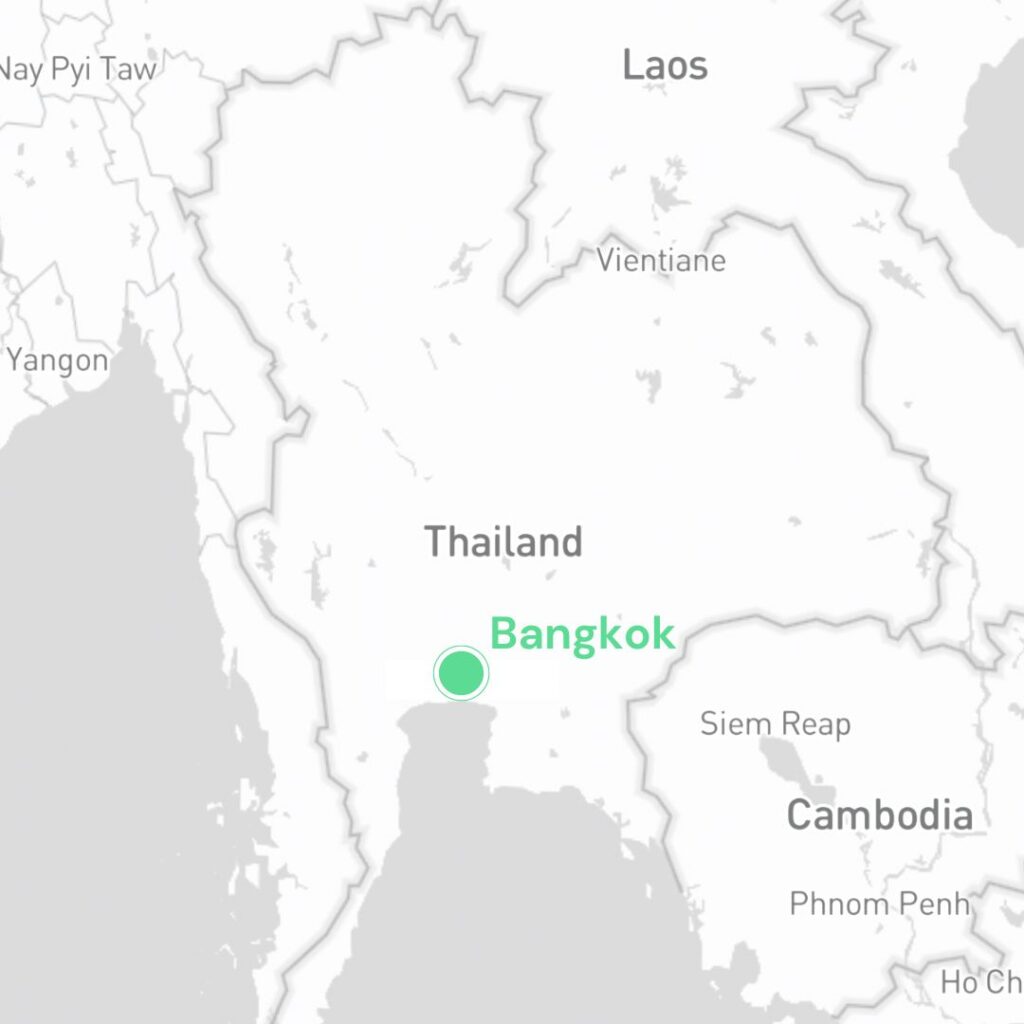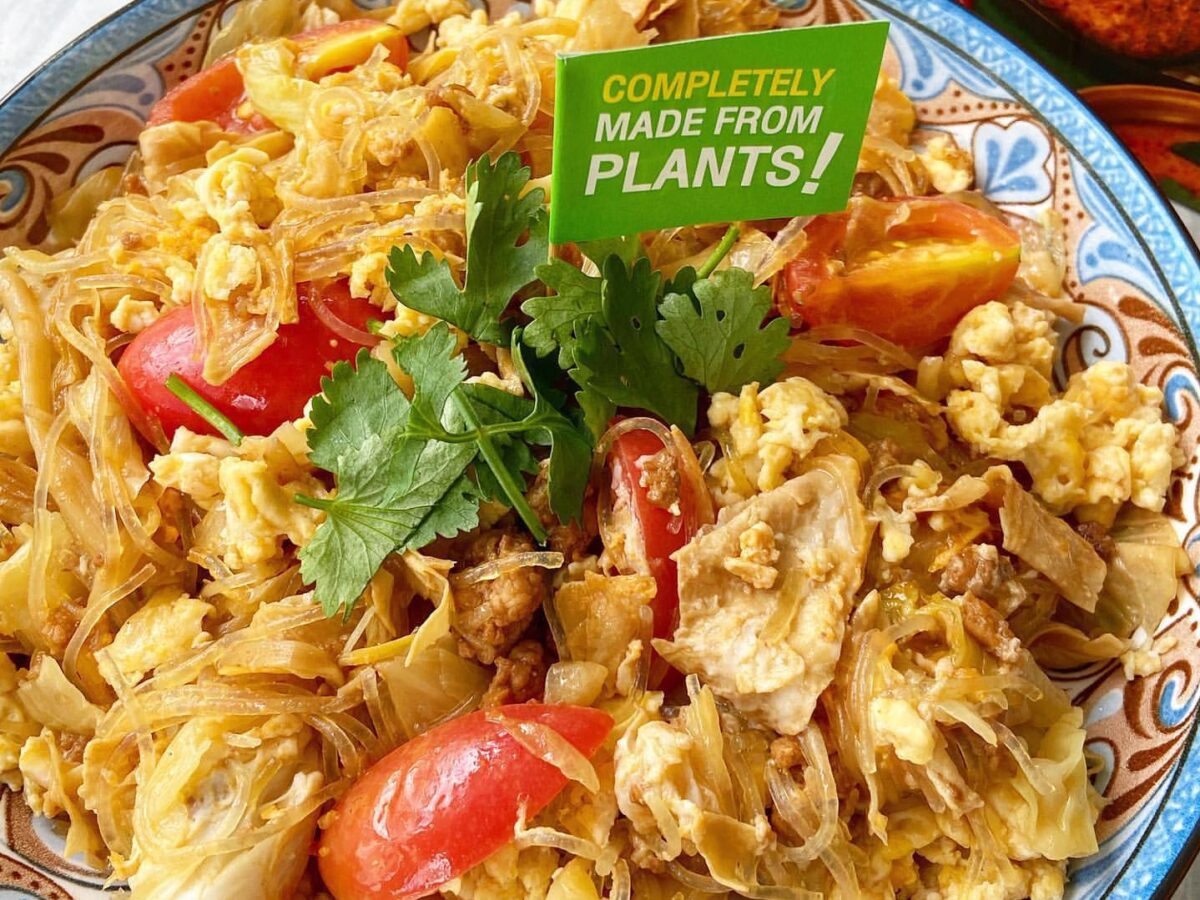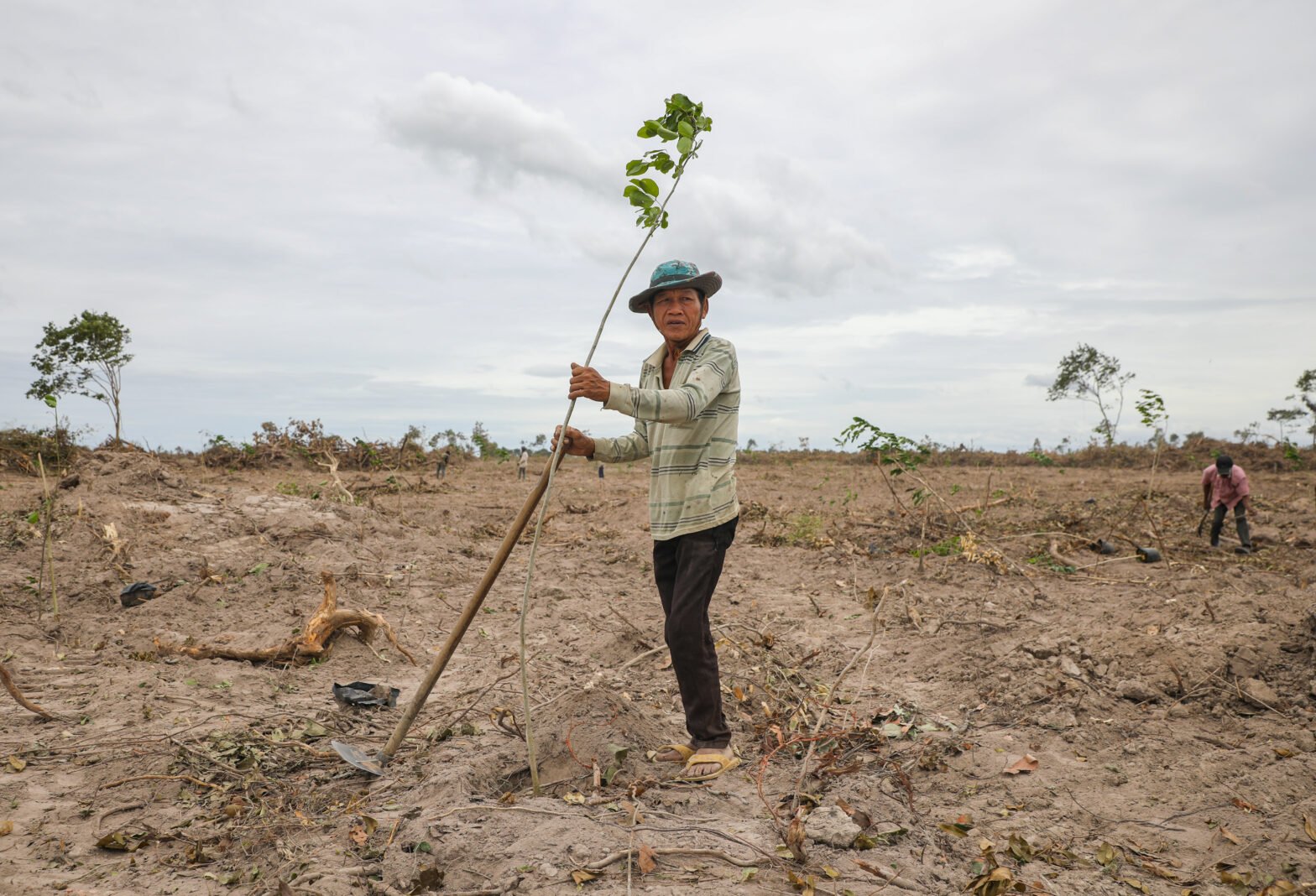BANGKOK, THAILAND ― Most people in Thailand enjoy eating meat, even though large numbers refrain from eating beef and other kinds of red meat due to their religious beliefs. In fact, many types of meat such as pork, chicken, fish and seafood are the staple for Thai cuisine that people eat every day.
However, this culinary trend is poised to change. In recent years the alternative meat products, made from plant protein, have been gaining popularity among Thai consumers.
According to statistics by Euromonitor, Thailand has seen a gradual growth of the new alternative meat market at about 2%-10% annually since 2016 – while research by DuPont Nutrition & Biosciences also highlighted a major increase in the demand for plant-based alternatives to meat, specifically in Thailand and China.
In these countries, it is predicted that the market will grow by a staggering 200% in the next few years.

A recent analysis by KASIKORN Research Center, published earlier this month, also predicted that despite facing the impacts of an economic downturn resulting from the Covid-19 pandemic, Thailand’s plant-based meat businesses will continue to enjoy substantial growth. It is estimated that the market value will reach a new high of 4.1 billion baht (US$115.9 million) by the end of 2022.
This represents a stark difference from the current market for conventional meat production, where the rate has stagnated at about 2.9 million tons per year since the industry reached peak output in 2014, according to the UN’s Food and Agriculture Organization (FAO).
Meanwhile, domestic meat consumption is also slowing down as the FAO’s statistics reveal that meat consumption per capita in Thailand has been in a continuous decline since 2014.
With the growth of these innovative plant-based meat substitute products in Thailand, more and more business operators, both big and small, are now joining in. This includes industry players as well as small investors from both within the country and elsewhere.
As of 2022, there were at least 16 major brands of alternative meat products already on the market in Thailand.
One of the pioneers in Thailand’s alternative meat market is Vorakan Tanachotevorapong, the founder of More Meat, a Thai plant-based meat brand made exclusively from mushrooms.
Vorakan was among the first investors to enter this relatively new business sector. He caught the rising alternative meat wave early on as a plant-based product importer in 2017, before opening his own plant-based food company under the brand More Meat two years later.
“In the last few years, the market for plant-based protein has grown rapidly beyond the strict vegetarian consumer group, as more and more people switch their sources of protein to alternative meat,” he said.
With his insight into the plant-based meat business, Vorakan has successfully promoted the More Meat brand and gained a solid foothold in the increasingly competitive market among the heavyweight competitors in the business, such as Thailand’s giant food conglomerate Charoen Pokphand Group, the producer of ready-to-eat plant-based meal VG for Love and a plant-based meat product called Meat Zero.
The well-known US-based plant-based food company Beyond Meat Inc is also competing for Thai consumers.

Vorakan said the reason behind the rising popularity of plant-based meat is its resemblance to real meat: its appearance, taste and texture have been designed to mimic the real thing.
However, unlike conventional meat made from parts of slaughtered animals, these alternative meat products are derived from plant-based ingredients such as soybean, wheat, pea, mushroom or mycoprotein (fungal protein).
Vorakan says these alternative meat products promise both greener and healthier substitutes for conventional meat. The latter have been blamed for causing many chronic diseases and environmental harm during their production cycles.
Such alternatives appeal to the very big “flexitarian” consumer group of around one fourth of Thailand’s population that do not eat a strict vegetarian diet, but who want to eat less meat for either health or environmental reasons.
“I noticed that people are becoming more health conscious. They are seeking a nutritious diet for maintaining their healthy lifestyle. So, a meat substitute from plants is an ideal product for these consumers, because it has similarly high protein as a meat, but with zero cholesterol and very low fat,” he said.
This echoes a survey by Krungthai Compass Research Centre, which found that in order to have a healthier lifestyle, up to 53% of Thai consumers considered reducing their daily meat intake, while 45% were determined to eventually switch to a vegetarian diet entirely if they hadn’t already.
Plant-based meat also appeals to environmental conscious consumers, according to Vorakan, who says the production of plant-based meat requires far less land and resources compared to the equivalent amount used to rear livestock. He also argues that it generates significantly fewer impacts on the environment.
According to Greenpeace, the global rise of meat consumption is bad for the planet, as the meat industry is a major contributor to the climate crisis and many other serious environment problems.
This is because the livestock sector accounts for about 14.5% of greenhouse gas emissions worldwide, or about 7.1 Gigatons of CO2-equivalent per year, which is roughly equivalent to the emissions from the transportation sector.
Moreover, Greenpeace also pointed out that the unsustainable expansion of grazing pastures as well as monoculture industrial plantations for feed crops also contributes to major deforestation, mass biodiversity loss and serious agrochemical contamination and phosphorus pollution of land and water bodies around the world.
Meanwhile, a 2018 study published in the journal Nature revealed that switching to plant-based diets is one of the essential measures to reduce the environmental effects from meat production and ensure sustainability of the food system. The study found that we can cut down up to 73% of our individual carbon footprint globally by refraining from eating meat and dairy products.
Environmentally and financially sustainable
Vorakan has been operating in the plant-based meat sector since before the business started booming. One of his realizations is that Western-style plant-based meat products, usually made from soy protein and shaped into a burger patty or sausage, did not fit in with the consumer habits of typical Thai people.
“I found that the imported plant-based products are not exactly healthy due to their high sodium content. They are also primarily made from soy, which is not quite a sustainable raw material for both the business and environment, as we need to import soy from abroad,” he said.
“This is why I opened my own startup plant-based meat brand, as I want to develop the products that are matched with Thai consumers’ demands and can also support local farmers by using local crops as raw materials.”
As a result, he chose locally farmed spiltgill mushrooms (Schizophyllum commune) from Thailand’s Songkhla province as the main ingredient for his products. He says it resembles the texture of pork and has high protein content and other nutrients.
Using locally-farmed spiltgill mushrooms also benefits both local farmers and the company economically, he claimed. While the company accesses a reliable source of high-quality raw materials for plant-based meat production, farmers can likewise sell their mushrooms at a fair price.
According to Vorakan, More Meat’s plant-based meat from spiltgill mushrooms has been well received by consumers. He reveals that the company continues to research new plant-based meat from other domestic crops in order to develop new products with different tastes and textures, as well as those from local farmers.
“Since Thailand’s plant-based food market has grown so fast and more business operators are joining the competition, we have to stay alert in order to stay ahead in the increasingly competitive market,” he said.
“Thailand has a very high diversity of food crops, and we can turn it our advantage for research and development of new plant-based meat products. We also plan ahead to export our products to other countries.”

As the boom in alternative meat is a global phenomenon, many countries around the world, especially the wealthy developed nations, are also seeing a rapid rise in market value in the plant-based meat sector. This means there may be new opportunities for Thai business operators to export their products.
According to a new report by Grand View Research, as of last year, the net value of the global plant-based meat market was $5.06 billion. This is considerable growth considering that only six years earlier, the plant-based meat market was estimated to be $3.75 billion in 2015.
The global plant-based meat market is projected to expand further and reach $24.8 billion by 2030, as the report estimated a compound annual growth rate (CAGR) of the plant-based meat market at 19.3% from 2022 to 2030.
A report by the Good Food Institute also revealed that the net value of the plant-based meat market in the United States jumped from $811 million in 2018 to about $1.4 billion in 2020. Plant-based products sales have grown 72% in the past two years alone.
In response to the argument that plant-based meat has a relatively high price compared to conventional meat, Vorakan says he has no intention of lowering his prices to compete with other meat products.
In his opinion, the current price is fair both to consumers and the company, and he claims he does not want to pay the farmers he buys his raw materials from poorly.
Although some brands are selling their products at the very low price of about 39-70 baht ($1-2), most of the plant-based food products on the market are pricey compared with pork or chicken, which is the main animal protein for most Thais.
According to the analysis on Thailand’s plant-based food retail market, the average price of 200 grams of plant-based meat is now about 140 baht ($3.80), which is twice as expensive as pork (around 60-80 baht per 200 grams).
This price barrier is seen by many analysts as the major challenge that could hinder the growth of the plant-based meat market in the country – and likely elsewhere as well.
Future innovations in cultivated meat
Even though right now all the alternative meat products in Thailand’s market are plant-based, there is another kind of meat product that may also be counted in this category: cultivated, or lab-grown meat.
As its name suggests, cultivated meat is an emerging food innovation produced from slaughter-free meat protein grown artificially from animal tissues in a lab.
While this kind of alternative meat is still derived from an animal, it uses many fewer resources than conventional meat. It also does not require an animal to be slaughtered, so it’s often thought to be analogous to plant-based meat by environmental and animal-rights advocates.
As of now, there are three research teams from Thailand involved in this technology: the Veterinary Stem Cell and Bioengineering Innovation Center of Chulalongkorn University, SPACE-F Global Food Tech Incubator & Accelerator Program led by Mahidol University and the Charoen Pokphand Foods Pcl conglomerate.
According to Dr Chenphop Sawangmake, head of Veterinary Stem Cell and Bioengineering Innovation Center, the principle behind cultivated meat is to mimic the normal cells and muscle growth of a living organism. Scientists then gather stem cells from the animal and subsequently grow the meat from their samples in a laboratory.
Instead of raising the meat with animal feed, lab-grown meat is cultivated in a warm, sterile vessel with a solution called a growth medium, which contains nutrients including salts, proteins and carbohydrates.
“With this technology we can also genetically modify the meat to have more nutrients or special characteristics for consumption,” he added.
Since the meat cultivation is done in a closed, clean laboratory, Dr Chenphop said this new technique of meat production is far safer for both the environment and our health.
“The meat cultivation technology allows us to produce meat with significantly less land and water than traditional animal farming, which also [means avoiding the emissions of] methane and other agriculture-related pollution that are usually caused by industrial farms,” he said.
To Dr Chenphop’s point, methane is a highly potent greenhouse gas (GHG), about 80 times more powerful than carbon dioxide, which is also emitted in large quantities during livestock production, according to the FAO.
Moreover, meat cultivation in labs can also eliminate the risks of zoonotic disease transmission and cut down the use of antibiotics, which are serious health issues resulting from modern farming practices.
This story was supported by the Internews Earth Journalism Network under the special collaborative project on One Health and meat in the Asia Pacific entitled “More Than Meats the Eye.”
.





